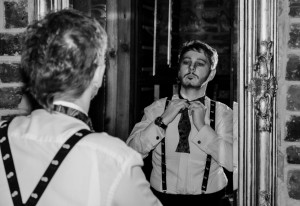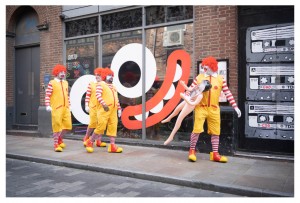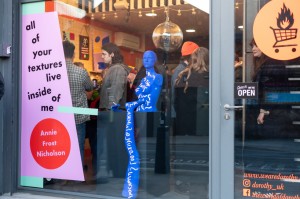“I think we work best in places that are a bit weird”: Happy Birthday Black Dogs
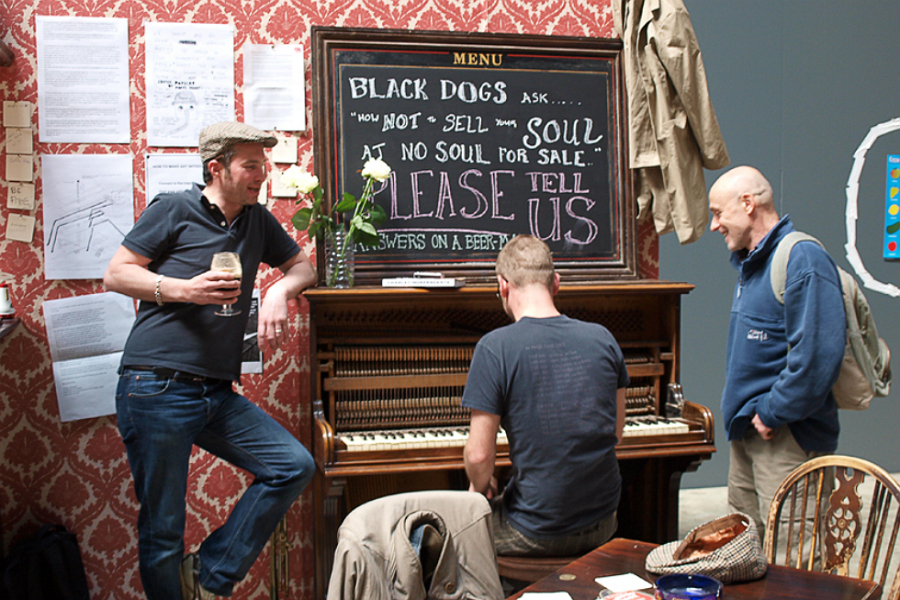
As the irrepressible and socially engaged art collective celebrate 10 years, will they ever stop challenging the arts system? Linda Pittwood finds out…
A non-profit, evolving, critical art collective hailing from Leeds, Black Dogs have been prodding and dissecting our ideas about the art world for the last ten years. The group — founded by Andy Abbott and Dave Ronalds in 2003 — approach art as a space in which to experiment with and question social, economic and political ideas.
Key moments include their 2010 exhibition for Tate Modern’s festival of independent art organisations, No Soul For Sale — which saw them ask, ‘How Not To Sell Your Soul At No Soul For Sale’, encouraging other exhibitors to visit their pop-up pub to share their experiences of receiving no pay or expenses — and 2004′s Arte Et Labore and Technically Wrong exhibitions at the Cloth Workers Hall — turning Pizza Express into a space for ’young’ artists in Leeds to exhibit, and having to take the entire space down on weekends.
We spoke to Andy Abbott about the politics of DIY, making your own opportunities and what the next 10 years have in store…
Hi Andy. How do you think Black Dogs fits into the wider arts infrastructure in Leeds? (i.e. do you have any key partnerships? How do you complement the more mainstream arts activity in the city?)
Andy Abbott: We do less stuff in Leeds now than we used to. When we started out, there was much less in the way of artist-led spaces or initiatives, or opportunities/spaces in which ‘young’ or less established artists could show work. So we made our own opportunities, and did what we could with the means and resources available to us.
We took more influence from the DIY music, activist and squatting scenes in Leeds than the institutional art stuff. That said, things like Situation Leeds public arts festivals in 2005 and 2007, and the early Light Night festivals from 2006-2008, felt like exciting and inspiring things to be part of. At that moment, it felt to me that a different kind of art might have been brewing in Leeds, one that reflected the lack of a conventional Art World presence in the city; that was more socially-engaged and political.
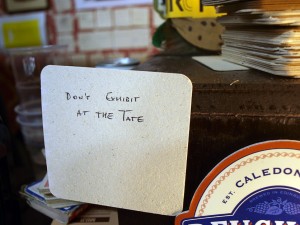
As the more prominent arts organisations have grown and developed I think the art scene in the city has become more standardised. I think Black Dogs works best in places that are marginal, a bit weird, unconventional and that have an alternative narrative to the (culturally driven) neoliberal city. In those places, art can still surprise and engage new audiences in different ways of thinking about and approaching the world. So we’re mostly doing stuff in Bradford and elsewhere now! There’s still some great stuff going off in Leeds but I think the sort of art scene that has grown in the last few years has made it a less interesting place for us to work.
Do you think that artists make a conscious choice between DIY and gallery representation? How do you see these two approaches working together (or not?)
I don’t know much about the ins and outs of gallery representation, but there’s a minority of artists (some of us included) who prefer not to pursue a ‘career’ within the Art World and for whom the Do-It-Yourself approach and ethos is a political position. That minority is made up of people who might disagree with the commercialisation of art, the manner in which institutions are run, those who believe in a different form of organisation, and people for whom self-managing and self-organising simply suits them better. Of course there’re plenty of people out there whose approach to DIY is that it is simply a necessary first stage in getting in to the Art World proper and for whom the political inferences are unimportant.
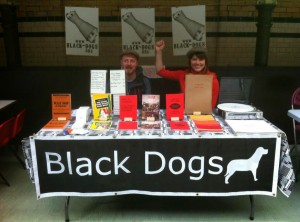
What are the advantages and the challenges of having a non-hierarchical, loosely formed group?
I’m always a bit wary of the term non-hierarchical being used to describe how we operate. Hierarchies exist within the collective — some people lead on certain projects or elements of the collective — but we try to be conscious of these and shake them up when required. Likewise the open and loose membership is in actuality for the majority of the time the same few people meeting together and making key decisions about the direction of the group — but we try to disrupt this when things are in danger of getting staid and repetitive. Being non-hierarchical and fluid are challenges in themselves, things that we can’t achieve fully but that we aim towards without letting the manner in which the group is organised/managed overshadow the art we make/do together.
With that in mind, could you tell me a bit more about some of the art that you and the wider group produce?
In recent years, we have moved from putting food and drink and music into galleries, to organising parties and putting art into that context. Some of the group who are based in London are doing a research project looking into the politics of parties, party scenes and hosting in art; its called Wish You’d Been Here… In Bradford/Leeds we organise club nights with a critical edge under the name Bare Plume – these events combine food, cocktails, bands and films e.t.c. Quite a few of us are involved in playing music and being in bands as well as art production.
The idea of mapping occurs quite a lot in what I – and some other members of the group – do. It’s because we are geeky and we like maps, but also because in making participatory events that prompt a conversation is what is important to us, but then you want something to exist afterwards. Some examples of this are the Festival of Pastimes and the Saltaire Cat Map. They both invite people to look at spaces in a different way.
What have been Black Dogs’ key moments?
Arte Et Labore and Technically Wrong exhibitions at Cloth Workers Hall (2004)… there were no spaces available to ‘young’ artists in Leeds at the time so we turned the upstairs of Pizza Express into a gallery — having to take it down on weekends. Consequences at Whitehall Waterfront (2006, that then became Project Space Leeds)… Our worst exhibition that made us reconsider our approach and helped us realise bigger is not always better. And also in 2006: A Night Down The Pub and Black Dogs Panto. Two events we put on for a laugh that were much more successful than our ‘proper’ exhibition that year!
No Soul For Sale (2010). A project we did at Tate Modern that raised a lot of questions in the group. We ended up building a replica of the pub we met in in Leeds in the Turbine Hall. And Black Dogs Quarterlies (2013) — a series of publications that helped the group to operate across the UK.
Who is your audience?
We have different audiences for different projects, many of which respond to a specific area or community/communities whom we like to get involved in the development of that project as participants or agents. I think there’s another level of Black Dogs’ audience out there — those who have followed the group and are interested in our overall practice, as well as those that buy our publications — but I’d be hard pushed to say who they are, and we don’t really take that into account when making decisions about what we’re going to do next.
What is Black Dogs working on right now?
We’re working on a radio play of a project we did in Bradford last year. It started out as a few meetings gathering together people that had been involved in Bradford’s counter-cultural scene in the late ’60s and ’70s, especially those that had worked with or come into contact with Jeff Nuttall (who wrote a book called Bomb Culture and taught at Bradford College for a while). These conversations helped form a guided walk around an area of Bradford that had been earmarked as the city’s ‘cultural quarter’ in regeneration plans, which ultimately never happened. Hopefully we’ll have the radio version done in the next month!
How do you see the group evolving over the next 10 years? In terms of projects, geographies and participants?
It’s hard to say. We’ve never had a long-term plan and I think it’s important to keep the option of ‘Black Dogs’ dissolving or changing beyond recognition open at all times. I think as long as people feel some affinity with what we’ve done in the (recent) past, however, and there’s the drive for participants to use their spare-time creatively and in collective projects, then Black Dogs will keep on keeping on.
Linda Pittwood
More on Black Dogs here – all images courtesy the collective



